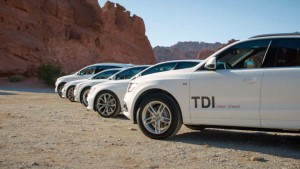
Audi is recalling 850,000 diesel-powered vehicles in Europe to fix them so they meet emissions standards.
Audi, already under fire for rigging some of its diesel-powered vehicles, said Friday that it will recall 850,000 of its products to update emissions control software.
The move came days after rival Mercedes-Benz announced the recall of 3 million vehicles to bring them into compliance with European emissions laws. The latest announcement by Audi does not cover vehicles sold in North America where it had previously been involved in a series of recalls and legal settlements involving rigged diesels.
Separately, Audi is one of three luxury automakers who took steps to fix the price of diesel emissions treatment systems, according to a report in the German news magazine Der Spiegel. The others are BMW and Porsche. Audi and Porsche are both subsidiaries of Volkswagen AG, the automaker that in late 2015 admitted rigging more than 11 million diesel vehicles sold worldwide.
Audi’s recall is aimed at updating the software on 850,000 vehicles using 2.0- and 3.0-liter engines. The fix is meant to bring the vehicles into compliance with European emissions laws. Similar steps have already been taken for vehicles previously sold by sibling brands Porsche and Volkswagen.
(Audi takes heat over ad demeaning to women. For the story, Click Here.)
With the fix, Audi said it “aims to maintain the future viability of diesel engines” and is confident the move “will counteract possible bans on vehicles with diesel engines.”
In 2015, Volkswagen admitted that it had developed a method of testing when its diesel products were undergoing emissions tests, automatically reducing levels of pollutants such as smog-causing oxides of nitrogen. In real world use, however, emissions could increase nearly 40-fold.
Since then, more automakers have faced charges of rigging their own diesels, including Mercedes’ parent Daimler and Fiat Chrysler Automobiles.
(Click Here for more about Daimler’s recall of 3M diesels in Europe.)
Regulators and lawmakers across Europe have begun to question the continued marketing of diesel vehicles. Paris has considered an outright ban, as had the southern German state of Baden-Wuerttemberg, the home of Daimler AG. Regulators there said they would reject such a proposal only if automakers came up with an emissions fix. A “diesel summit” is scheduled for Aug. 2 in Berlin, with industry officials meeting with Germany’s transport minister.
The diesel scam has so far cost Volkswagen and its various brands about $30 billion. And, earlier this month, prosecutors in both the U.S. and Germany filed charges against 60-year-old Giovanni Pamio for his role in the diesel emissions scheme covering the various Volkswagen Group brands. Pamio, who headed thermormodynamics in Audi’s Diesel Development Department, was the eighth VW employee charged in the scheme.
(U.S., German prosecutors target Audi, make arrest in expanded diesel probe. Click Here for the latest.)
But legal problems are mounting across the industry. The report by Der Spiegel indicates regulators in Europe are now looking at possible price-fixing by BMW, Audi and Porsche. The report indicates they collaborated on emissions control technologies, as well as the price of an ammonia-based liquid, known as AdBlue, used to reduce diesel pollutants. VW sent a letter to regulators earlier this month conceding possible anti-competitive actions, the news magazine reported.
